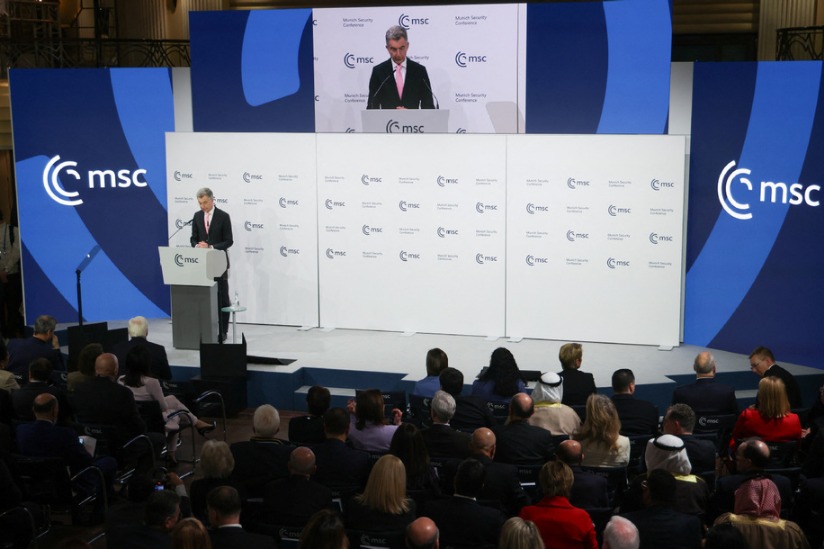A more inclusive path beneficial for multipolar world


Since the Russia-Ukraine conflict broke out, the major power game has intensified, a vast number of developing countries have become more marginalized, and Western domination in international relations and agendas has become increasingly obvious. It is because of these factors that the BRICS Summit in Johannesburg, South Africa, to be held from Tuesday to Thursday, has attracted wider global attention.
The focus of the 15th BRICS Summit is likely to be on its expansion. Up to now, 23 countries have applied to join the grouping and another 20 countries have expressed their desire to be part of BRICS.
First, the convening of a meeting on such a large scale in South Africa will be the first of its kind under the BRICS mechanism. When BRICS was established, the Western media criticized it, saying that given the huge differences among the member states, the grouping would find it difficult to reach a consensus on any issue or become a force in international relations. They have been proved wrong.
With the BRICS mechanism maturing, more and more countries are applying to join it and the voice of BRICS in international relations has been gaining strength with each passing day. Even French President Emmanuel Macron expressed his willingness to be a guest on this summit. No wonder the West, of late, has been paying greater attention to BRICS' development and seems even concerned over it. Western media have not only started smearing BRICS as a challenge to the rule-based world order, but also are trying to disintegrate the "BRICS" from within and isolate China and Russia by luring India to join the Inted State's "Indo-Pacific" mechanism, praising Brazil's positive role in international affairs and pressing South Africa to maintain a safe distance from China.
Second, the BRICS Summit may deliberate on a non-US dollar global trade settlement currency.
Since the outbreak of the Russia-Ukraine conflict, Russia, as a member of the BRICS, has been the victim of severe sanctions imposed by the United States, the European Union and their allies. This prompted Russia to use the ruble or other currencies to settle its foreign trade deals. In fact, in June 2022, Russian President Vladimir Putin said the BRICS countries are working on a new international reserve currency based on a basket of currencies used by them.
And since being re-elected Brazilian president at the beginning of this year, Luiz Inacio Lula da Silva has been calling for developing a new global trade currency.
However, despite the US losing its credit rating recently and despite its constantly rising sovereign debt, the de-dollarization trend is yet to gather momentum, possibly because the BRICS countries have different views on de-dollarization. Russia, for instance, has suffered a serious blow in terms of foreign trade due to the sanctions announced by the US, the EU and their allies, and for being excluded from the Society for Worldwide Interbank Financial Telecommunication system.
Therefore, among the BRICS countries, Russia is resolute in its stance on de-dollarization. It has even achieved preliminary results — by selling almost all the US Treasury bonds it held, significantly reducing the use of the US dollar in its foreign trade, actively promoting the Russian coined SPFS system — an alternative to the SWIFT system.
Given the long-term colonial influence on its economy, Brazil, too, understands the impact of the dollar hegemony on its economy. That's why President Lula has been working with other BRICS leaders to decide on a common currency to be used in intra-BRICS trade.
Besides, due to historical and practical reasons, South Africa has been advocating the reform of the global financial system and has started settling foreign trade deals in non-dollar currencies.
As for India, it places greater emphasis on practical interests in its foreign trade and has been settling some of its trade deals in its own or its trade partner's currency. In fact, India intends to develop the rupee as an international currency, and has a clear stance on de-dollarization.
China, on the other hand, has been emphasizing currency swaps for years and promoting the use of the yuan or its trade partner's currency to settle foreign trade deals, which have been welcomed by many countries.
In spite of the stances of the BRICS countries on de-dollarization, however, South Africa's ambassador-at-large for Asia and BRICS Anil Sooklal said BRICS at present has no plans to deliberate on a new global currency to replace the US dollar, and de-dollarization is not on the Johannesburg summit's agenda. According to Sooklal, the BRICS countries have not given a direct call for de-dollarization but are only making efforts to settle their foreign trade in local currencies other than the dollar.
Settling foreign trade deals in non-dollar currencies is slowly but surely becoming a global trend, reflecting many countries' desire to realize currency sovereignty.
However, despite being closest to the US dollar as a global reserve currency and as a significant trade settlement instrument, the euro has lost some of its global value due to the EU imposing sanctions on Russia. Consequently, given its near monopoly in international trade, the US dollar is likely to remain the main trade settlement currency in the near future. So BRICS countries have to agree to a trade settlement currency that would coexist with the dollar.
In a West-dominated world, BRICS provides a more diversified and inclusive development path for Asian, African, and Latin American countries through cooperation with all countries in the Global South, so as to build a multilateral organization that enjoys greater international influence and discourse power. BRICS not only represents the multipolarity of the international order, but also advocates the use of diverse methods to overcome international challenges. In the future, therefore, how the BRICS countries strengthen cooperation, and increase trade and investment will decide the development of the grouping.
The author is deputy secretary-general of the Center for One Belt One Road, Chinese Academy of Social Sciences. The views don't necessarily reflect those of China Daily.
If you have a specific expertise, or would like to share your thought about our stories, then send us your writings at opinion@chinadaily.com.cn, and comment@chinadaily.com.cn.

































